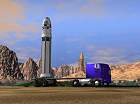|
A
Conversation* with Paula Berinstein - Part II
I could then easily imagine the dam bursting on new investments in all sorts of crazy space ideas, especially if the general economy is doing well. Does this sound reasonable to you? What do you think it will take to light a boom in space development? Possibly. It depends what comes out of these developments. If people's imaginations are fired, then yes, a boom could ensue. If there's bad press--say, people think the experiences don't meet their expectations--then possibly not. I think one person who could help the effort tremendously is Richard Branson. I don't know if he's still planning to go ahead with his idea of a space airline--I hope so. He has the following and the glamor to make space tourism really exciting. I recently attended a leadership conference in L.A. at which he spoke. You should have seen the crowd! After he got off the stage, people rushed to talk to him. The security force had to turn them away. No other speaker elicited anything like that reaction, and the roster included Tom Peters, Ehud Barak, Lou Dobbs, and James Baker. Space needs to be made cool. There are any number of ways to do that, but that's the basic answer. HS: One of the things that drives me crazy about discussions in the general press concerning space development is the obsession with the public opinion polls. It's as if nothing can happen in space unless +51% of the public are in favor of it. That goes back, of course, to the post-Sputnik boom in public interest in space that drove the creation of NASA and the Moon Race. But that was a one-off and you will never get that kind of vast public interest in space short of a landing by an alien spaceship or the sighting of a comet heading for earth. Or a trip to Mars. HS: Perhaps, assuming we solve the conundrum of getting enough public support in the first place to convince the government to fund such a trip. But in general, I'm thinking more about the second, third and subsequent trips to Mars or the Moon or wherever. It's difficult to maintain broad public interest after the first exciting event. I think the focus should instead be on building and maintaining the involvement of a relatively small (10-15%) segment of the public that in polls always show strong enthusiasm for space. As long as that level is great enough to assure ongoing funding, I think that's a great idea. If the missions somehow become self-supporting (which I don't see for a long time), then you don't need to engage the public quite as much. However, I think there may be ways that you can keep people's interest for a long time, and those are: 1) Give them personal stakes in the activities, probably financial, but also having to do with fame, power, and bequeathing legacies, and 2) Create controversy. As we all know, people are motivated by self-interest, and they love to argue. Engage them in one or more of those ways, and you've got their attention.
No, I don't think they are sideshows. Do you think all the computer companies that preceded Microsoft and died out were sideshows? No. They paved the way for huge companies like Microsoft, Sun, and Oracle. Would it be better had they survived? Probably, but what's done is done. HS: I saw a quote in Aviation Week a few months ago by the vice chairman of Boeing in which he said that commercial space tourism is currently impractical because their studies showed that it would take at least $15 billion to build a ship to carry 50 people to space at a ticket price of $150,000. To enter the market, that may be true. But how about later on? HS: Obviously, the thought that Boeing could build a small sub-orbital to carry two or three people did not occur to him anymore than the thought that Boeing should build a Piper Cub sized airplane for general aviation. Yes, I can imagine that. Boeing is not a small potatoes company. They need to see the possibility of making billions in order to become interested. HS: To me this clearly shows how small companies are essential in getting a new industry off the ground. The initial market is small so volumes and profits are too low for what a big company requires. In reporting on the recent Futron/Zogby space tourism survey of wealthy households, the Space News headline said that "only" 19% of the respondents would pay $100k for a sub-orbital flight. Well, that number may not sound exciting to a Boeing-sized company or to an aerospace industry reporter but the people at the sub-orbital startups must have been breaking out the champagne. That's a far bigger market than even many space enthusiasts had guessed and plenty big enough to provide the handful of passengers per week needed to support a small sub-orbital tourism company. I agree with your point here. There's nothing wrong with small businesses, and in fact, the scenario you describe fits perfectly into my "baby steps" idea. HS: I really believe that the development of a private sub-orbital industry will be the real birth of the space age in terms of public participation. Regardless of NASA funding or government policies, this is something that space entrepreneurs can just go out and do by themselves. The funding required, in the few tens of millions of dollars range, is well within what startups can raise, and there is a real, honest to God market waiting. Once the industry begins to develop, profits can be plowed back into more and more advanced vehicles and eventually ones capable of going to orbit. I completely agree with you. HS: I also like the analogies to the development of the PC industry but I think there is another helpful analogy as well. I can remember the first transistor AM radios and cheap compact cars from Japan back in the 1960s. Nobody took them very seriously but the Japanese electronics and car companies continually revised and improved their products in small increments and over time the progress was obviously enormous. (The same thing has started with Japanese consumer robots.) I think the sub-orbital companies can begin a similar process for space access. While, as you say, it's likely they will eventually be snapped up by big companies, there is also the chance one or two of them could someday become the Lexus and Acura of spaceship makers! Hear that, space companies? Hire this man as a consultant immediately! He knows what he's talking about. I do think that big aerospace could overtake and co-opt the small companies, yes. But if the big ones buy the small ones, the small companies' investors will be happy and they will have succeeded to a point. What we probably all should have *is* the big companies doing development while the infrastructure is put in place. They have the deep pockets. I have a hard time imagining that small companies will take us all the way. Look what happened in the development of the Internet. At first it was a free-for-all. Now the big companies are taking over. Like it or not, that's the way a lot of industries work. And those that require huge investments, like space, will inevitably develop along the same kind of path. I don't think this is the best thing for egalitarianism, but unless a bunch of small companies form consortia, I can't see them having enough resources to build the infrastructure. The thing to do is to keep the big companies honest during the process by buying their shares, speaking up, and lobbying the government. And voting!
Ever watch Babylon 5? If you imagine the various alien societies as earthly nations and cultures, the situation looks pretty analogous to your 2025 scenario. Some will get along, some will fight, cultures will rub off on each other, and our cosmic neighborhood will be a vital and flourishing place. Despite the grief, it will be worth doing. I am not a utopian. I can't see that we will eventually come to lasting world peace whether we go into space or not, so why not go? If you don't do something because it won't be perfect, you'll never move from your chair. As for the society that will develop in space, it's hard to say. If we don't solve this conflict between Islamic fundamentalists and the rest of the world by then, all bets will be off. We have to find a way to bridge that gap, make a permanent peace by all sides giving up something. Beating each other into submission will never solve the problems, for there will always be resentment. Talk to each other. Don't make threats. People with nothing to lose are always dangerous. If we can work out win-win situations in space, we could have a major blossoming of culture, scientific progress, education, and society in general. The new and unfamiliar will lead us to all kinds of societal changes, the likes of which we can scarcely imagine now. HS: Yes, my wife and I became great Babylon 5 fans from watching reruns while we lived in Sweden. I keep hoping that sci-fi writers, TV show, and film makers will pickup on similar kinds of scenarios like you describe of what can happen in "real space" in the near term. There are fantastic story line possibilities in the situation of a rapidly developing space community just waiting for the next Roddenberry to exploit. I think James Cameron is coming up with something here. He's a big supporter of the Mars Society and has the clout to pull off some hugely interesting media projects. I know that J. Michael Straczynski, creator of Babylon 5, had a lot of trouble keeping the show on the air, and that its successor, Crusade, which I really liked, was cancelled prematurely. Science fiction is a niche product these days. I think today's kids are more interested in video games and instant messaging than they are in science and technology. I love video games and IM, but I think science fiction is a real boon to a person's development. It inspires you to ask "Why?" and "What if?" Gosh, how can life be interesting if you don't ask those questions? As you said earlier about the need to make space "cool" again, a new sci-fi approach to near-term space could also help in overturning the common perception, especially among the young, that real space is bland and dull, at least compared to intra-galactic imaginings. I have to add another one of my refrains here. The military/techie image of space that adheres to the field is a huge turnoff for a lot of people, especially women. I think changing that will take a very long time. Space companies need to focus on the resulting experience for people, not on rockets and equipment. Tell people how much fun it will be! As I mentioned before, you should have seen those older ladies' eyes light up when I mentioned being able to fly on the Moon. HS: In your book you mentioned the large segment of libertarians and free marketeers among space activists. But there are also a number of left, " third-way" types such as Kim Stanley Robinson who put communes and gift economies on Mars in his trilogy. Are these groups heading for a collision? There have already been rumblings from some environmentalists about keeping the Moon "pristine", i.e. free of bad ol'commercial enterprises like He3 mines and tourist stops. Yes, they will collide. What they need to do is talk respectfully with each other and work out compromises. Let's hope that some out-of-the-box thinkers emerge to help bring everyone's interests together. I can't believe there isn't a way. What I do fear is that some will attempt to sabotage a compromise, and I don't know how to deal with that. HS: What other space related activities are you now involved in? I hope that you plan to continue monitoring and writing about private space developments. I'm very excited to be serving as a judge for the Clarke-Bradbury Science Fiction Essay Contest. This is a contest for young people that solicits stories featuring science fiction technologies that can be used for space travel, exploration, and settlement. The purpose is to
Isn't that great? I can't wait to see these essays. If people are interested, they should see the Web site for the contest at www.itsf.org. The deadline is February 28, 2003. I do keep up with the industry, and I am doing interviews and book talks. I also do consulting. I have no plans for another book yet. I'm waiting to see how Making Space Happen does before I commit to another. So if you'd like another one, go out and buy it and show me there's a market. HS: That's certainly one space market I hope booms! Thank you, Paula. Paula
welcomes further questions and comments on her book. Hear
also David Livingston's interview with Paula at |
|||||||


